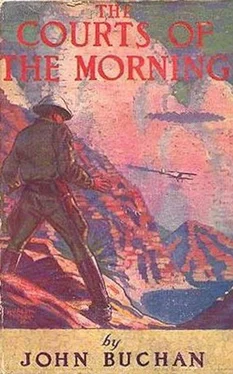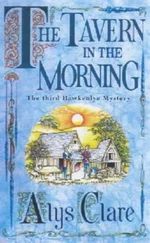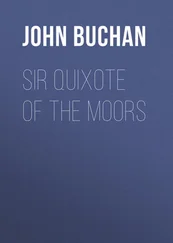John Buchan - The Courts of the Morning
Здесь есть возможность читать онлайн «John Buchan - The Courts of the Morning» — ознакомительный отрывок электронной книги совершенно бесплатно, а после прочтения отрывка купить полную версию. В некоторых случаях можно слушать аудио, скачать через торрент в формате fb2 и присутствует краткое содержание. Жанр: unrecognised, на английском языке. Описание произведения, (предисловие) а так же отзывы посетителей доступны на портале библиотеки ЛибКат.
- Название:The Courts of the Morning
- Автор:
- Жанр:
- Год:неизвестен
- ISBN:нет данных
- Рейтинг книги:3 / 5. Голосов: 1
-
Избранное:Добавить в избранное
- Отзывы:
-
Ваша оценка:
- 60
- 1
- 2
- 3
- 4
- 5
The Courts of the Morning: краткое содержание, описание и аннотация
Предлагаем к чтению аннотацию, описание, краткое содержание или предисловие (зависит от того, что написал сам автор книги «The Courts of the Morning»). Если вы не нашли необходимую информацию о книге — напишите в комментариях, мы постараемся отыскать её.
The Courts of the Morning — читать онлайн ознакомительный отрывок
Ниже представлен текст книги, разбитый по страницам. Система сохранения места последней прочитанной страницы, позволяет с удобством читать онлайн бесплатно книгу «The Courts of the Morning», без необходимости каждый раз заново искать на чём Вы остановились. Поставьте закладку, и сможете в любой момент перейти на страницу, на которой закончили чтение.
Интервал:
Закладка:
Don Alejandro dropped his eyeglass. "From the Gran Seco," he said. "That is the type Gran Seco. European, I think--the tall man might be a Swede--going from or returning to their place of work. No. I do not know any one of them. Olifa is full of these birds of passage, who linger only for a day. They do not mix with our society. They are civil and inoffensive, but they keep to themselves. Observe the chic of their clothes, and the yellow buttonholes. That is the fashion of the copper magnates."
"They look to me like pretty sick men," said Archie.
"That, too, is their fashion. Those who go to that uncouth place speedily lose their complexions. It may be the copper fumes or some fever of the hills."
"I should rather like to go there," said Archie.
Don Alejandro laughed.
"Ah, you are intrigued. That is like an Englishman. He must be for ever hunting romance. No doubt a visit to the Gran Seco can be accomplished, but it must first be arranged. The railway beyond Santa Ana is not for the public. It is owned by the company, and their permission is necessary to travel on it. Also there must be a permit from the Gobernador of the province, who is also the Company's president, for the workers in the mines are a brutal race and the rule of the Gran Seco must be like the rule of a country in war-time.... If you wish, I will put the matter in train. But I do not think it is quite the place for a lady. Such cheeks as madame's are not for the withering airs of the hills."
"I will follow the Olifero custom," said Janet. "Your ladies, Don Alejandro, are very fond of pearl powder."
The restaurant was filling up. It appeared that many Oliferos were dining, for large lustrous women's eyes looked out of dead-white faces. At the far end of the room, close to the band, a noisy party took their seats at a table. They were all young, and, since they had not troubled to change, their clothes made a startling blotch of colour among the sober black and white of the other guests. All looked as if they had just left a golf-course, the men in knickerbockers of white flannel and both sexes in outrageous jumpers.
"Behold our protectors!" said Don Alejandro with a touch of acid in his tone. "Behold the flower of Yanqui youth! No. I do not know them--for that you must ask my colleague, Señor Wilbur. But I know where they come from. They are from the big Yanqui yacht now in the harbour. It is called the Corinna."
"Good lord! That was Mike Burminster's boat. I didn't know he had sold it." Archie regarded the party with disfavour.
"I do not know who is the present owner, except that he is a Yanqui. The guests I should judge from their appearance to have sprung from Hollywood."
"They were lunching here to-day," said Janet. "I saw them when Archie was inquiring about his lost kit-bag.... There was a girl among them that I thought I must have seen before.... I don't see her here to-night.... I rather like the look of them, Don Alejandro. They are fresh, and jolly, and young."
"Believe me, they will not repay further acquaintance, Lady Roylance." Don Alejandro was unconsciously imitating his Castilian mother. "They come here in opulent yachts and behave as if Olifa were one of their vulgar joy-cities. That is what they call 'having a good time.' Yanqui youth, as I have observed it, is chronically alcoholic and amorous, and its manners are a brilliant copy of the parrot-house."
The three had their coffee in the spacious arcade which adjoined the restaurant. It was Don Alejandro's turn to ask questions, and he became for a little the English exile, seeking eagerly for news--who had married whom, what was thought in London of this and that--till Olifa dropped from him like a mantle and he felt himself once more a European. Presently their retreat was invaded by other diners, the band moved thither from the restaurant, and dancing began in a cleared space. The young Americans had not lingered over their meal, and had soon annexed the dancing-floor. Fragments of shrill badinage and endearments were heard in the pauses of the music.
Don Alejandro advised against liqueurs, and commended what he called the Olifa Tokay, which proved to be a light sweet wine of the colour of sloe-gin. Holding his glass to the corona of light in the centre of the patio, he passed from reminiscence to philosophy.
"You are unfortunate pilgrims," he said. "You come seeking romance and I can only offer the prosaic. No doubt, Sir Archibald, you have been led to believe that we Latin Americans are all desperadoes, and our countries a volcanic territory sputtering with little fires of revolution. You find instead the typical bourgeois republic, as bourgeois as the United States. We do not worry about liberty, for we have learned that wealth is a better and less troublesome thing. In the old days we were always quarrelling with our neighbours, and because we conscripted our youth for our armies there was discontent and presently revolution. Now we are secure, and do not give occasion for discontent."
"Someone told me that you had a pretty effective army."
"We have a very effective police. As for our army, it is good, no doubt, but it is small. For what should we use our army? We have no ambition of conquest, and no enemy against whom we need defence."
"Still, you can't count on perpetual peace, you know. You are rich, and wealth means rivals."
"Have we not the League of Nations?" Don Alejandro cried merrily. "Is not Olifa even now a member of the Council? And is there not the Monroe Doctrine, invented by the great-grandfathers of those depraved children who are dancing yonder?"
"Oh, well, if you like to put it that way----"
"I do not like to put it that way. I do not believe in the League of Nations, and I do not love the United States, and I regard the Monroe Doctrine as an insult to my race. But what would you have, my dear Sir Archibald? We have chosen prosperity, and the price we pay for it is our pride. Olifa is a well-nourished body without a soul. Life and property are as safe here as in England, and what more can the heart of man desire? We have a stable Government because our people have lost interest in being governed. Therefore I say, do not propose to study our politics, for there is nothing to study. To you in England, with a bankrupt Europe at your door and the poison of Communism trickling into your poverty, politics are life and death. To us, in our sheltered Hesperides, they are only a bad dream of the past. There is no mystery left in Olifa...."
As Don Alejandro spoke, the four men from the Gran Seco were moving through the arcade. They held themselves stiffly, but walked as lightly as cats, deftly steering their way among the tables and at the same time keeping close together. They looked neither to right nor left, but, as they passed, Janet and Archie had a good view of their waxen faces. The eyes of all--the pale eyes of the tall man, the beady eyes of the Jews, and the fine eyes of the Latin--had the same look of unnatural composure, as if the exterior world did not exist for them and they were all the time looking inward in a profound absorption. They had something of the eery detachment of sleepwalkers.
Don Alejandro was talking again.
"Be content, my friends, with what we can offer--our beauty and our civilisation. Think of us as a little enclave of colour between the glooms of the great sea and the clouds of the great mountains. Here man has made a paradise for himself, where during his short day of life he can live happily without questioning."
Archie had been looking at Janet.
"I think we both want to go to the Gran Seco," he said.
Chapter II
Archie left Janet writing letters and started out next morning to explore the city. The first taste of a foreign town was always to him an intoxication, and, in the hot aromatic sunshine of that month which for Olifa is the sweet of the year, the place seemed a riot of coloured and exultant life. He descended the broad terraced road which by easy gradients led from the hotel to the twisted streets of the old city. Some of the calles were only narrow ravines of shade, where between high windowless walls country mule-carts struggled towards the market-place. Others were unhappily provided with screeching electric tramways, so that the passer-by on foot or on a horse had to mount high on the ill-paved side-walk to avoid destruction. Presently he came into a hot market-place, where around an old Spanish fountain were massed stalls laden with glowing flowers and fruit, and strange unwholesome fishes, and coarse pottery, and garish fabrics, and country-woven straw hats. Through this medley Archie limped happily, testing his Spanish on the vendors, or trying with most inadequate knowledge to disentangle the racial mixture. The town Oliferos were a small race, in which he thought there must be considerable negro blood, but the countryfolk were well-made and up-standing, often with a classic and melancholy dignity in their faces. There were lean, wild-looking people, too, whose speech was not any kind of Spanish, with an odd angle to their foreheads and the shyness of an animal in their small anxious eyes, who squatted in their dark ponchos beside their mules and spoke only to each other. An Indian breed, thought Archie--perhaps from the foothills.
Читать дальшеИнтервал:
Закладка:
Похожие книги на «The Courts of the Morning»
Представляем Вашему вниманию похожие книги на «The Courts of the Morning» списком для выбора. Мы отобрали схожую по названию и смыслу литературу в надежде предоставить читателям больше вариантов отыскать новые, интересные, ещё непрочитанные произведения.
Обсуждение, отзывы о книге «The Courts of the Morning» и просто собственные мнения читателей. Оставьте ваши комментарии, напишите, что Вы думаете о произведении, его смысле или главных героях. Укажите что конкретно понравилось, а что нет, и почему Вы так считаете.












